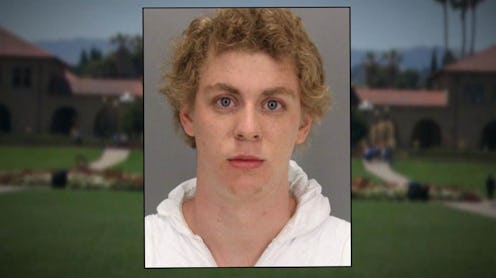
Before Brock Turner was sentenced to six months behind bars, the woman that Brock Turner sexually assaulted read an articulately written, heartbreaking letter aloud to the courtroom. In doing so, she stood up for all victims of sexual assault and refused to blame herself for the atrocity, defying what's unfortunately become a societal norm: "I was too drunk," or "I shouldn't have worn a short dress." Now, the survivor is explaining why she's chosen to speak out about her sexual assault anonymously.
On Tuesday, KTVU Fox 2 anchor Frank Somerville received a statement from the woman via the prosecutor.
I remain anonymous, yes to protect my identity.But it is also a statement, that all of these people are fighting for someone they don't know.That's the beauty of it. I don't need labels, categories, to prove I am worthy of respect, to prove that I should be listened to.I am coming out to you as simply a woman wanting to be heard.Yes there is plenty more I'd like to tell you about me.For now, I am every woman.
In this particular case, the victim's anonymity sharply contrasts Turner's focus on his own identity as a student athlete — someone who surely doesn't look like a "criminal." During his trial, Turner used his status to make his crime appear less severe, blaming the rape instead on "party culture" and "drinking." Ultimately, Judge Persky empathized with the 20-year-old athlete more than he did with the victim. He concluded that prison would be detrimental for Turner.
A prison sentence would have a severe impact on him. I think he will not be a danger to others.
Those who have been following the case over the past several days and stand behind the victim's bravery do not share the judge's sentiment. The woman's original letter to the judge, which was heavily circulated on social media after being read aloud during Thursday's trial, struck a heartstring in women and men nationwide who believe that rape culture is downplayed in American society. In the letter, she described how she believed cases like these would pan out. She never thought it would be so difficult to prove that she didn't consent.
I thought there’s no way this is going to trial; there were witnesses, there was dirt in my body, he ran but was caught. He’s going to settle, formally apologize, and we will both move on. Instead, I was told he hired a powerful attorney, expert witnesses, private investigators who were going to try and find details about my personal life to use against me, find loopholes in my story to invalidate me and my sister, in order to show that this sexual assault was in fact a misunderstanding. That he was going to go to any length to convince the world he had simply been confused.
And before releasing the statement regarding her anonymity, she had already made it clear that she represents all women who have found themselves in similar predicaments, faced with doubt during the most painful of times. She ended her letter with this statement:
And finally, to girls everywhere, I am with you. On nights when you feel alone, I am with you. When people doubt you or dismiss you, I am with you. I fought everyday for you. So never stop fighting, I believe you. As the author Anne Lamott once wrote, “Lighthouses don’t go running all over an island looking for boats to save; they just stand there shining.” Although I can’t save every boat, I hope that by speaking today, you absorbed a small amount of light, a small knowing that you can’t be silenced, a small satisfaction that justice was served, a small assurance that we are getting somewhere, and a big, big knowing that you are important, unquestionably, you are untouchable, you are beautiful, you are to be valued, respected, undeniably, every minute of every day, you are powerful and nobody can take that away from you. To girls everywhere, I am with you. Thank you.
Less than a week after the case ended, these words have sparked a mass movement of solidarity that, with luck, will shed light on the severity and real-life impacts of the college rape epidemic.